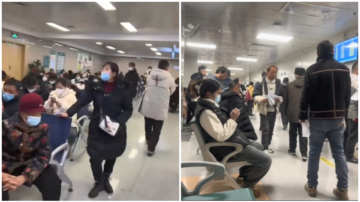【新唐人2013年06月20日訊】國務院星期三公布了全球人口販賣問題的報告。關於中國的部分,報告說:「中國仍然是被迫勞動和從事性交易的男人、女人和兒童的來源地、中轉地和目地地。」中國過去連續9年,被美國列入人口販賣的監視名單,並且被劃在第二個等級。在今年的報告中,中國降到了第三個等級。而人口販賣問題的報告中也再次抨擊了中共的勞教制度。
《2013年人口販賣問題報告》說,中國境內兩億多流動人群中的人口販賣情況很招搖。大部分人口販賣發生在中國境內,在那裡的男子、婦女和兒童被強迫勞動和賣淫。
報告中指出,中國(共)政府未能完全遵守消除人口販賣的最低標準,過去連續9年,在被監視名單中,被劃在第二個等級。
中國「東南大學」法學教授張讚寧表示,販賣人口事例年年發生,而政府對販賣人口的處罰力度不夠。
中國東南大學法學教授張讚寧:「為甚麼會發生這種情況,主要原因,一個就是中國的就業問題很難;第二個就是:貧富差距越來越大,一些貧困階層他不得不鋌而走險,做這個違法的事情;第三個原因,也是最主要的原因,就是中國社會道德淪喪,道德越來越滑坡。很多人為了唯利是圖,經常超越道德的底線。」
大陸媒體報導,江西撫州籍熊某等6名熊氏成員組成的拐賣、強迫婦女賣淫團夥,自今年3月起,先後從廣東深圳、東莞等地,拐賣譚某等13名婦女到休閑娛樂場所從事賣淫活動,從中每次收取70元至100元。截至案破時,共收取強迫賣淫非法所得4萬多元。
原《河北人民廣播電臺》編輯朱欣欣認為,人口販賣帶來的一系列問題,跟中國經濟發展有密切關係。
原《河北人民廣播電臺》編輯朱欣欣:「因為各地經濟發展不平衡,分攤到人均人口上就很低。尤其在中國落後的地區,勞動力剩餘比較多,還有人口的素質問題,素質低,他在勞動市場競爭處於劣勢,找不到工作,這樣這些人就通過其他非正常手段來謀取財富。這樣就為人販子提供條件。」
另一方面,在強迫勞工勞動問題上,美國的這份報告指出,由國家所支持的強迫勞動是所謂勞動教養制度的一部分。據報導,中共政府會從中牟利。在至少320個這種勞教場所裡,對許多勞動教養所的囚犯和被拘禁者來說,經常分文不取。被囚禁者有時因完成不了工作量而遭毆打。
張讚寧指出,中共的勞教制度超越了憲法,因此,勞教制度本身不合法。
張讚寧:「中國的憲法或法律都明確規定,人身自由是不受侵犯的。但是勞教制度就超越了這一條法律,它可以不經過法院、檢察院決定和批准,直接由公安部門限制公民的人身自由,這是違法的,也是違憲的一個行為。」
去年12月26號,《福克斯》新聞網報導說,美國俄勒岡州一名母親朱麗葉•凱斯(Julie Keith)在她購買的萬聖節裝飾物當中,發現一封求救信。
信中說:「這個萬聖節產品是在中國瀋陽馬三家勞教所製作的,那裡犯人被迫一天工作15個小時,沒有週末和節假日休息。幾乎沒有工資,每個月只有10元人民幣。」
這封信,再次揭開了中共當局廣設勞教所的實際黑幕。
採訪編輯/唐睿 後製/黎安安
China Listed on the US Trafficking in Persons Report
The U.S. State Department released the global
human trafficking report on Wednesday.
Regarding China it says, "China is still the origin,
transitional station and destination of forced labor and
sex trade for men, women and children.
For nine consecutive years, China has been on the
trafficking watch list, and is classified in the second level, this year is
in the third level.
The report also criticized China's labor re-education system.
Trafficking in Persons Report 2013 says
human trafficking is open and
bold among over two hundred million migrants in China.
Most trafficking occurred in China, where men, women
and children are forced to do labor and sex work.
The Report points out that Chinese (CCP) government
failed to fully comply with minimum standards
to eliminate trafficking over the past nine consecutive years.
On the monitored list China is in the second grade.
Zhang Zanning, law professor at China Southeast University,
said that serious human trafficking exists in China every year,
but the government has insufficient penalties.
Zhang Zanning:"Why is there such a situation?
A main reason is China's employment problem,
and a second one is the growing wealth gap.
Some of the poorer people have to take risks
on illegal practices.
And the third and most important reason is
China's social and moral turpitude like a moral landslide.
Lots of people become mercenaries,
frequently going beyond bottom line of morality."
Mainland media reported that six men surnamed Xiong
in Jiangxi province formed a forced prostitution gang.
Since March this year, they trafficked 13 women from
Guangdong and other places to be prostitutes in entertainment centers.
For each of the sex transactions, they obtain 70 to 100 yuan.
At the time of arrest, they had profited over 40,000 yuan
from the forced prostitution.
Former editor at Hebei People's Radio, Zhu Xinxin, said
human trafficking has close connections with
China's economic development.
Zhu Xinxin:"Because local economies develop unevenly,
the per capita income is rather low.
Especially in less-developed areas,
there is more surplus labor.
Since they are less competitive in the labor market,
they cannot find jobs.
As a result, they resort to abnormal means to seek wealth,
thus providing the conditions for human trafficking."
On the other hand, the U.S. report points out that
state-sanctioned forced labor is part of
the so-called labor education system.
Chinese government reportedly profits from the practice.
In at least 320 such camps, the inmates usually
receive nothing from their work.
Very often they are seriously beaten for
failing to complete assigned work.
Zhang Zanning pointed out that Chinese Communist
regime's labor education system is against the constitution, and thus is itself illegal.
Zhang Zanning:"China's Constitution and other laws
explicitly protect human freedom, but the labor camp system goes against this principle.
Without prosecution or court judgment, the public security
departments can deprive individual freedom at will.
This is not only illegal, but also unconstitutional."
Dec. 26 last year, Fox News reported that an Oregon mother,
Julie Keith, found an SOS letter in her Halloween decoration kit.
The letter said, "This Halloween product is made
in Masanjia labor camp in Shenyang, China.
People who work here have to work 15 hours a day
without Saturday, Sunday or any holiday break.
There is almost no salary, only 10 yuan a month."
This letter once again exposed the truth about the shady
labor camps Chinese authorities have established nationwide.
《2013年人口販賣問題報告》說,中國境內兩億多流動人群中的人口販賣情況很招搖。大部分人口販賣發生在中國境內,在那裡的男子、婦女和兒童被強迫勞動和賣淫。
報告中指出,中國(共)政府未能完全遵守消除人口販賣的最低標準,過去連續9年,在被監視名單中,被劃在第二個等級。
中國「東南大學」法學教授張讚寧表示,販賣人口事例年年發生,而政府對販賣人口的處罰力度不夠。
中國東南大學法學教授張讚寧:「為甚麼會發生這種情況,主要原因,一個就是中國的就業問題很難;第二個就是:貧富差距越來越大,一些貧困階層他不得不鋌而走險,做這個違法的事情;第三個原因,也是最主要的原因,就是中國社會道德淪喪,道德越來越滑坡。很多人為了唯利是圖,經常超越道德的底線。」
大陸媒體報導,江西撫州籍熊某等6名熊氏成員組成的拐賣、強迫婦女賣淫團夥,自今年3月起,先後從廣東深圳、東莞等地,拐賣譚某等13名婦女到休閑娛樂場所從事賣淫活動,從中每次收取70元至100元。截至案破時,共收取強迫賣淫非法所得4萬多元。
原《河北人民廣播電臺》編輯朱欣欣認為,人口販賣帶來的一系列問題,跟中國經濟發展有密切關係。
原《河北人民廣播電臺》編輯朱欣欣:「因為各地經濟發展不平衡,分攤到人均人口上就很低。尤其在中國落後的地區,勞動力剩餘比較多,還有人口的素質問題,素質低,他在勞動市場競爭處於劣勢,找不到工作,這樣這些人就通過其他非正常手段來謀取財富。這樣就為人販子提供條件。」
另一方面,在強迫勞工勞動問題上,美國的這份報告指出,由國家所支持的強迫勞動是所謂勞動教養制度的一部分。據報導,中共政府會從中牟利。在至少320個這種勞教場所裡,對許多勞動教養所的囚犯和被拘禁者來說,經常分文不取。被囚禁者有時因完成不了工作量而遭毆打。
張讚寧指出,中共的勞教制度超越了憲法,因此,勞教制度本身不合法。
張讚寧:「中國的憲法或法律都明確規定,人身自由是不受侵犯的。但是勞教制度就超越了這一條法律,它可以不經過法院、檢察院決定和批准,直接由公安部門限制公民的人身自由,這是違法的,也是違憲的一個行為。」
去年12月26號,《福克斯》新聞網報導說,美國俄勒岡州一名母親朱麗葉•凱斯(Julie Keith)在她購買的萬聖節裝飾物當中,發現一封求救信。
信中說:「這個萬聖節產品是在中國瀋陽馬三家勞教所製作的,那裡犯人被迫一天工作15個小時,沒有週末和節假日休息。幾乎沒有工資,每個月只有10元人民幣。」
這封信,再次揭開了中共當局廣設勞教所的實際黑幕。
採訪編輯/唐睿 後製/黎安安
China Listed on the US Trafficking in Persons Report
The U.S. State Department released the global
human trafficking report on Wednesday.
Regarding China it says, "China is still the origin,
transitional station and destination of forced labor and
sex trade for men, women and children.
For nine consecutive years, China has been on the
trafficking watch list, and is classified in the second level, this year is
in the third level.
The report also criticized China's labor re-education system.
Trafficking in Persons Report 2013 says
human trafficking is open and
bold among over two hundred million migrants in China.
Most trafficking occurred in China, where men, women
and children are forced to do labor and sex work.
The Report points out that Chinese (CCP) government
failed to fully comply with minimum standards
to eliminate trafficking over the past nine consecutive years.
On the monitored list China is in the second grade.
Zhang Zanning, law professor at China Southeast University,
said that serious human trafficking exists in China every year,
but the government has insufficient penalties.
Zhang Zanning:"Why is there such a situation?
A main reason is China's employment problem,
and a second one is the growing wealth gap.
Some of the poorer people have to take risks
on illegal practices.
And the third and most important reason is
China's social and moral turpitude like a moral landslide.
Lots of people become mercenaries,
frequently going beyond bottom line of morality."
Mainland media reported that six men surnamed Xiong
in Jiangxi province formed a forced prostitution gang.
Since March this year, they trafficked 13 women from
Guangdong and other places to be prostitutes in entertainment centers.
For each of the sex transactions, they obtain 70 to 100 yuan.
At the time of arrest, they had profited over 40,000 yuan
from the forced prostitution.
Former editor at Hebei People's Radio, Zhu Xinxin, said
human trafficking has close connections with
China's economic development.
Zhu Xinxin:"Because local economies develop unevenly,
the per capita income is rather low.
Especially in less-developed areas,
there is more surplus labor.
Since they are less competitive in the labor market,
they cannot find jobs.
As a result, they resort to abnormal means to seek wealth,
thus providing the conditions for human trafficking."
On the other hand, the U.S. report points out that
state-sanctioned forced labor is part of
the so-called labor education system.
Chinese government reportedly profits from the practice.
In at least 320 such camps, the inmates usually
receive nothing from their work.
Very often they are seriously beaten for
failing to complete assigned work.
Zhang Zanning pointed out that Chinese Communist
regime's labor education system is against the constitution, and thus is itself illegal.
Zhang Zanning:"China's Constitution and other laws
explicitly protect human freedom, but the labor camp system goes against this principle.
Without prosecution or court judgment, the public security
departments can deprive individual freedom at will.
This is not only illegal, but also unconstitutional."
Dec. 26 last year, Fox News reported that an Oregon mother,
Julie Keith, found an SOS letter in her Halloween decoration kit.
The letter said, "This Halloween product is made
in Masanjia labor camp in Shenyang, China.
People who work here have to work 15 hours a day
without Saturday, Sunday or any holiday break.
There is almost no salary, only 10 yuan a month."
This letter once again exposed the truth about the shady
labor camps Chinese authorities have established nationwide.










